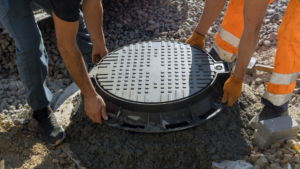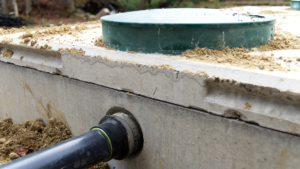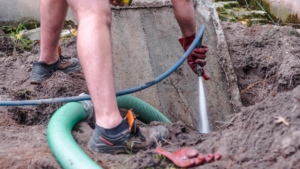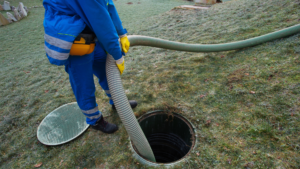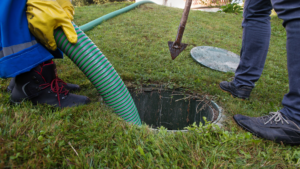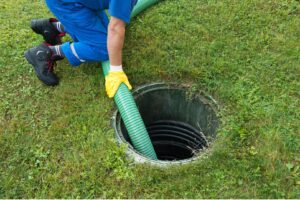Are you planning on installing a septic tank but unsure whether to tackle the job yourself or hire a professional? Septic tanks are an essential part of every homeowner’s waste management system, and it is important to consider all factors when deciding between DIY or professional installation. In this blog post, we will discuss the pros and cons of both options so that you can make an informed decision. We will also cover everything you need to know about septic tank installation, including the different types of systems available and their associated costs.
Understanding Septic Tanks
Septic tanks play a vital role in treating and disposing of household wastewater. These tanks are typically made of concrete or plastic and are buried underground. The efficient functioning of septic tanks relies on proper maintenance, including regular pumping and inspection to prevent costly repairs. One important aspect of septic tanks is their reliance on beneficial bacteria to break down solid waste. Understanding the importance of septic tanks and their maintenance is crucial for homeowners. Regular maintenance, such as routine pumping and inspections, ensures the longevity and proper functioning of the septic system. It is also a good idea to consider factors like percolation tests, the size of the drain field, and the type of septic system during the installation process. These considerations, along with high-quality materials, can contribute to a long-lasting and effective septic system.
What is a Septic Tank?
A septic tank is a large container that collects and treats wastewater from your home. It separates solid waste from liquid, allowing the liquid to flow into the drain field. It’s commonly used in rural areas as an alternative to municipal sewer lines. Proper installation and maintenance are crucial to prevent potential issues.

Prevalence of Septic Tanks
Septic tanks are commonly found in many areas, particularly in rural and suburban regions. In the United States, a large number of households rely on septic systems for their wastewater treatment. The prevalence of septic tanks is mainly due to the absence of municipal sewer lines in certain areas, making them a practical solution for waste management.
The use of septic tanks is often dictated by local regulations, which consider factors such as soil conditions and population density. These regulations ensure that septic tank installation is done in a way that minimizes environmental impact and protects public health. Homeowners who opt for septic tank installation also have the advantage of having control over their waste management, making it a good idea for those who prefer a more independent approach.
Considerations before Septic Tank Installation
Before proceeding with septic tank installation, several key considerations should be taken into account. First and foremost, conducting a thorough land survey is essential in identifying suitable locations on your property for the septic system installation.
Factors Affecting Septic Tank Installation Costs
When it comes to septic tank installation costs, several factors can influence the overall expense. One crucial factor is the size of the tank, which depends on the size of your household and water usage.
Different Types of Septic Systems and Their Costs
When choosing a septic system, there are multiple options to consider. Traditional systems are cost-effective and commonly used. They provide reliable wastewater treatment and are easy to maintain. However, in certain cases, alternative systems may be necessary due to soil or space limitations. These alternatives can be more expensive to install and maintain. Consult professionals to determine the right option for your property based on factors like soil composition, space availability, and local regulations. Consider factors such as percolation rates and drainage field size before making a decision.
Cost of Septic Tank Materials
When installing a septic tank, it’s important to consider material costs. The two common options are concrete and plastic. Concrete tanks are durable but require more labor and equipment during installation. Plastic tanks are lightweight and easier to install but have a shorter lifespan. Material costs vary based on tank size and local market conditions. Consider durability, maintenance, and local regulations when choosing a material for your septic tank. Evaluate these factors to make an informed decision that meets your budget and long-term needs.
Importance of Soil Testing and Permit Acquisition
Soil testing plays a crucial role in the installation of a septic tank system. It helps determine the soil’s ability to treat wastewater effectively, ensuring optimal performance and preventing potential issues in the future. The percolation rate of the soil, which measures its ability to absorb water, is particularly important in designing and sizing the septic system. By assessing the percolation rate, professionals can determine the appropriate size and configuration of the drain field or leach field, which allows the wastewater to disperse into the soil.

DIY vs. Professional Septic Tank Installation
When installing a septic tank, you have the option of DIY or professional methods. DIY may save money initially, but if done incorrectly, it can lead to expensive repairs later. Professional installation ensures proper planning, adherence to regulations, and long-term functionality.
Professionals assess soil conditions, design the system, and acquire necessary permits. This is especially important for complex systems or challenging soil conditions where DIY may not be feasible. Consulting professionals allows evaluation of the pros and cons of DIY based on your situation.
With professional installation, experts handle the job, ensuring regulatory compliance and effective functioning. It’s a good choice for first-time homeowners or those seeking a high-end septic system.
Advantages and Disadvantages of DIY Septic Tank Installation
DIY septic tank installation has advantages like cost savings and control over the process. However, it’s challenging and requires expertise. Inadequate installation can lead to system failure, contamination, and costly repairs. Hiring a professional ensures proper planning, compliance, and functionality. Professionals assess soil conditions, design the system, and acquire permits. They handle complex systems and challenging soil conditions effectively. Regular maintenance is necessary for optimal functionality.
Advantages and Disadvantages of Professional Septic Tank Installation
Professional septic tank installation has several advantages over DIY methods. Professionals ensure proper installation, leading to efficient waste management and a well-functioning system. Hiring professionals saves time and effort, reduces the risk of costly repairs, and ensures compliance with local regulations. On the other hand, DIY installation can lead to issues and costly mistakes. It requires technical knowledge and experience to install a septic tank correctly. Inadequate installation can result in system failure, contamination, and expensive repairs. Therefore, it’s crucial to consider the potential drawbacks and evaluate your capabilities before deciding on DIY installation.
Final Thoughts on Septic Tank Installation.
When it comes to septic tank installation, homeowners often face a dilemma between DIY and professional options. While DIY installation may seem like a good idea to save money, it’s essential to consider the pros and cons. DIY installation can indeed be cost-effective, but it requires extensive knowledge and experience that may not be available to the average homeowner.
Conclusion
To sum up, when it comes to septic tank installation, there are pros and cons to both DIY and professional approaches. While DIY installation may save you money, it requires a significant amount of time, effort, and knowledge. On the other hand, professional installation ensures that the job is done correctly and efficiently, but it comes with a higher cost. Ultimately, the decision should be based on your budget, skills, and comfort level with plumbing work.

